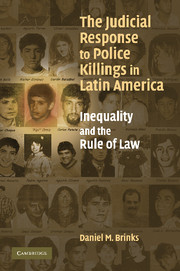Book contents
- Frontmatter
- Contents
- Preface
- 1 Effectiveness and Inequality in the Legal System
- 2 Charting Injustice in Argentina, Brazil, and Uruguay
- 3 Informational and Normative Shifts Across Jurisdictions
- 4 Buenos Aires – Political Interference and Informational Dependence
- 5 São Paulo – Normative Autonomy and Informational Failures
- 6 Uruguay – Strong Results from a Weak System
- 7 Córdoba – High Levels of Inequality in a Strong System
- 8 Salvador da Bahia – Social Cleansing Under Political and Judicial Indifference
- 9 Binding Leviathan
- Appendix: Methods, Case Selection, and Sampling
- References
- Index
Appendix: Methods, Case Selection, and Sampling
Published online by Cambridge University Press: 07 September 2009
- Frontmatter
- Contents
- Preface
- 1 Effectiveness and Inequality in the Legal System
- 2 Charting Injustice in Argentina, Brazil, and Uruguay
- 3 Informational and Normative Shifts Across Jurisdictions
- 4 Buenos Aires – Political Interference and Informational Dependence
- 5 São Paulo – Normative Autonomy and Informational Failures
- 6 Uruguay – Strong Results from a Weak System
- 7 Córdoba – High Levels of Inequality in a Strong System
- 8 Salvador da Bahia – Social Cleansing Under Political and Judicial Indifference
- 9 Binding Leviathan
- Appendix: Methods, Case Selection, and Sampling
- References
- Index
Summary
The fieldwork for this project took place during the course of an exploratory one-month trip to Argentina and Brazil in the summer of 1999, a much longer research trip to Argentina, Uruguay, and Brazil in 2000–01, and brief follow-up trips to Argentina and Brazil in 2004 and 2005. During the main research trip I spent four months in Buenos Aires, about three in São Paulo, and approximately a month each in Córdoba, Montevideo, and Salvador da Bahia.
The book works at three levels of analysis: countries, judicial districts, and individual legal cases. At the very outset, I chose three countries that, by reputation at least, promised some variation on the dependent variable: Argentina, Brazil, and Uruguay. As the data more or less confirmed, I expected Uruguay to be a “positive” case, Brazil to be the “negative” case, and Argentina to fall somewhere in the middle. What I did not expect was the magnitude of the cross-national variation or the important sub-national differences.
At the sub-national level, in each of the two federal countries (Brazil and Argentina), I selected two different legal environments – in each case, I compared the largest and most economically important city in the country to a more remote provincial capital, with similar populations (just over and just under two million) and a solid industrial base.
- Type
- Chapter
- Information
- The Judicial Response to Police Killings in Latin AmericaInequality and the Rule of Law, pp. 261 - 270Publisher: Cambridge University PressPrint publication year: 2007



